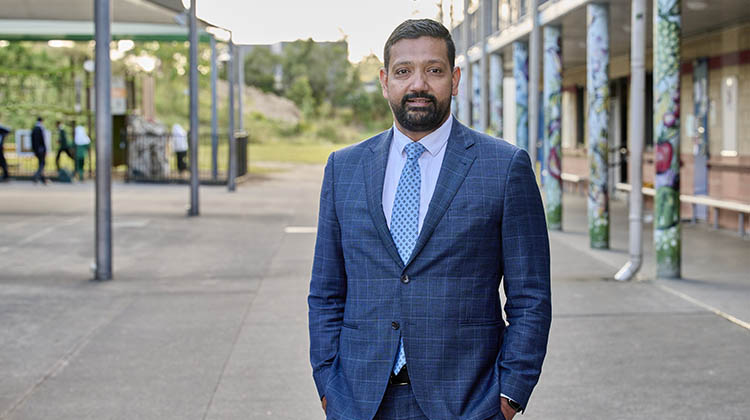Communicating to Build Unity

Australia likes to think of itself as a multi-cultural society, and we are one of the more successful ones, but what is less spoken of is how we tend to stay in our cultural lanes.
We still, mostly, educate kids along cultural and religious lines, and that can mean we don’t talk to or know as much as we should about others from different backgrounds, making for a shortfall in understanding and, at the very worst, suspicion and hostility.
The Islamic school system is a case in point, there is a gap in our knowledge of what happens behind the school gates of institutions like principal Ali Kadri’s Islamic College of Brisbane and prejudice can take root in that void.
In the latest of SBS’ excellent social experiment programs, The Swap, which you might have been watching, children from various backgrounds go to each other’s schools, hopefully, opening the lines of communication, encouraging understanding and giving students the opportunity to perhaps recognise something of themselves in the other kids.
Kadri has experienced racial and religious division at its extreme, and a desire to overcome that was at the heart of the social experiment explored in The Swap.
“There are many layers to racial and sectarian divisions. It starts with lack of communication that builds into mistrust and misinformation that grows into hate. This is often exploited by extremists and political opportunists. The combination of all this pushes communities further away from each other.
“The best way to curb it is to create an environment where people feel safe despite their differences and where communication is open, respectful and more importantly honest. We are all different and it is ok disagree, but it is not ok to hate or harm someone who you disagree with. As our nation matures, it is important our education system plays an important role in addressing gaps of communication in our society,” Kadri says.
To a degree, Kadri personifies the multicultural identity that many Australians share.
“I migrated to Australia as an international student at age 22. I have spent half my life in Australia and most of my adult life here. My career, my growth and achievement have all been in this country, and I am living an Australian dream, if there is such a thing. I am an Australian Muslim of Indian heritage,” Kadri says.
“Australia is my national identify, Islam is my faith and Indian is my ethnic identity. All three of these identities are exclusive yet complement each other. Our country is multi-racial and the state has no religion but accepts all religions. Likewise, Islam has no one country and is global like all faiths.”
Many schools provide some kind of religious education and Kadri believes that a faith-based education is still valuable.
“Faith based education provides Australians of faith a sanctuary to provide education in an environment that is conducive to the values and ethos of their faith. While our state is secular and often faith is not discussed or at worse discouraged in public sphere, it is important that we have faith-based education for those Australians who wish to pass their values and ethos to their children.
The inclusion of strategies in the curriculum designed to encourage cross cultural exchange should be a priority Kadri says.
“I believe that as an educational institution we must always be on a pursuit of excellence as it can never be fully achieved. With that in mind, I think we can most certainly learn more on how we can all create a culture of diversity, acceptance, and unity.
“I think it would be beneficial if the curriculum incorporated practical approaches such as those seen in The Swap to introduce Australians of different faiths and non-faith backgrounds to each other.”
If there is a conclusion to be drawn from the series, it is that students benefit from interacting with people from other backgrounds and that we quickly see more similarities than differences when we do that.
The most pleasant surprise from the series for Kadri was, “the speed at which the young students overcame biases. They were not only able to talk about them in a non-divisive manner but were also able to understand one another’s point of view. Despite not always agreeing with each other’s different perspectives, they were able to have open and respectful conversations about differing views.”
In the first program of the series Catholic school boy Isaac comes home and tells his parents that he admires some of the values he was exposed to after his placement at Islamic College of Brisbane, their concern is obvious.
For Kadri, this showed Isaac’s ability to think more deeply than most people of his age, “I can understand this would be unsettling for any parent but both his parents were quite respectful and engaged with him in a meaningful manner. That shows the kind of family they are and how lucky Isaac is to have such an upbringing. I also believe there are quite a lot of similarities between Christianity, Islam, and Judaism as all these religions stem from same roots.
“I recently received a very kind message from Isaac’s grandparents. It brought tears to my eyes and reinforced my belief that most Australians, regardless of their backgrounds, have a desire to understand each other and to live in a cohesive and united society. It was not so much a change as a revelation that came about as a result of being involved in The Swap.”
All three episodes of The Swap are available to stream on SBS On Demand now: www.sbs.com.au/ondemand/tv-series/the-swap/